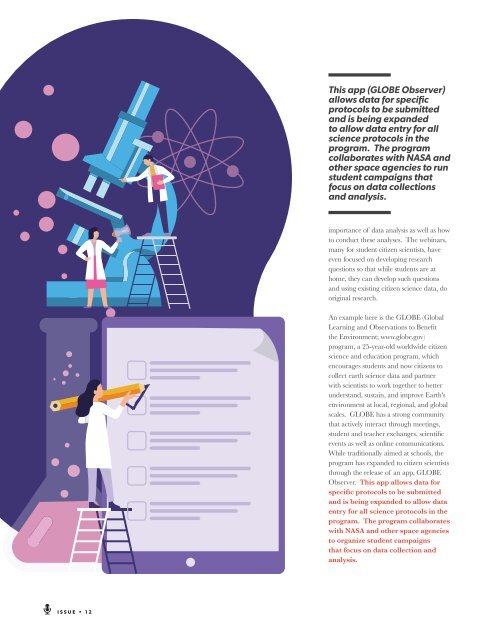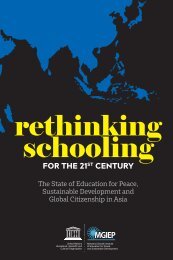The Blue DOT - 12: Reimagining Learning Spaces for Uncertain Times
You also want an ePaper? Increase the reach of your titles
YUMPU automatically turns print PDFs into web optimized ePapers that Google loves.
This app (GLOBE Observer)<br />
allows data <strong>for</strong> specific<br />
protocols to be submitted<br />
and is being expanded<br />
to allow data entry <strong>for</strong> all<br />
science protocols in the<br />
program. <strong>The</strong> program<br />
collaborates with NASA and<br />
other space agencies to run<br />
student campaigns that<br />
focus on data collections<br />
and analysis.<br />
importance of data analysis as well as how<br />
to conduct these analyses. <strong>The</strong> webinars,<br />
many <strong>for</strong> student citizen scientists, have<br />
even focused on developing research<br />
questions so that while students are at<br />
home, they can develop such questions<br />
and using existing citizen science data, do<br />
original research.<br />
An example here is the GLOBE (Global<br />
<br />
the Environment; www.globe.gov)<br />
program, a 25-year-old worldwide citizen<br />
science and education program, which<br />
encourages students and now citizens to<br />
collect earth science data and partner<br />
with scientists to work together to better<br />
understand, sustain, and improve Earth's<br />
environment at local, regional, and global<br />
scales. GLOBE has a strong community<br />
that actively interact through meetings,<br />
<br />
events as well as online communications.<br />
While traditionally aimed at schools, the<br />
program has expanded to citizen scientists<br />
through the release of an app, GLOBE<br />
Observer. This app allows data <strong>for</strong><br />
<br />
and is being expanded to allow data<br />
entry <strong>for</strong> all science protocols in the<br />
program. <strong>The</strong> program collaborates<br />
with NASA and other space agencies<br />
to organize student campaigns<br />
that focus on data collection and<br />
analysis.<br />
However, once COVID-19 became a pandemic the focus of the<br />
program shifted from data collection (because many of the <strong>12</strong>3<br />
countries involved in the program had imposed local movement<br />
restrictions) to data analysis. This pivot was supported with<br />
webinars about retrieving and analyzing data from the GLOBE<br />
database and other databases. In addition, over the last number<br />
of years, schools have begun to increase their instrumentation<br />
infrastructure so that data can be recorded automatically, which in<br />
this type of situation is a wonderful back-up <strong>for</strong> student collected<br />
data.<br />
One of the other challenges in this situation is ensuring<br />
that every student and citizen scientist has equal access to<br />
submitting and retrieving the data within a system. Given<br />
that most citizen science projects have apps and technology of some<br />
<strong>for</strong>m as part of their infrastructure, it is very important that project<br />
planners are mindful of the digital divide, which is still present in<br />
many areas around the world. Keeping this balance of upgrading<br />
and advancing technology <strong>for</strong> science citizens who may still be<br />
battling connectivity and technology updates is very important<br />
to the success of a project. Frustrations can often run high with<br />
technology; it should really enable engagement and involvement,<br />
<br />
<br />
between and even within countries.<br />
With an active community, such as GLOBE’s, it is important<br />
to keep it engaged, no matter the circumstances. As COVID<br />
<br />
maintain this engagement through its online infrastructure. It<br />
<br />
<br />
Caribbean, Near East and North Africa) with a web-conferencing<br />
tool. <strong>The</strong> RCOs has since held monthly calls with the GLOBE<br />
Country Coordinators (CC) in their regions; these have proved<br />
incredibly successful and have been highly subscribed to by the<br />
CCs. As all in person meetings has been cancelled, these calls help<br />
keep the community in<strong>for</strong>med and engaged; the high participation<br />
levels clearly show that it wants this type of contact. As <strong>for</strong> students<br />
and teachers, analysis of GLOBE data has shown that there is little<br />
change in data entry <strong>for</strong> student collected data, pre-COVID and<br />
while the pandemic continues. This again shows how engaged the<br />
community is and wants to be. Finally, as part of the program’s<br />
<br />
asked students to submit videos where they answered the question:<br />
What changes are you seeing in nature during the COVID-19<br />
pandemic? <strong>The</strong>ir observations are shown here: https://www.<br />
youtube.com/watch?v=kCMyb5Koq7E&list=PLfpnkASII_NahmvmqCcjaKSTZqdQ6tym&index=5<br />
In summary, overcoming uncertainty in a citizen science<br />
community in a situation such as this is based on<br />
• reaching out constantly to your members by whatever<br />
communication strategy works best <strong>for</strong> your project and community<br />
to reassure them that the project is still present and operating as<br />
normal as possible;<br />
• being honest with the community about the impact of the<br />
situation on the project;<br />
• encouraging engagement through data analysis, and data<br />
collection, only if safe and not contravening local movement<br />
restrictions;<br />
• creating or gathering additional resources <strong>for</strong> your community<br />
and sharing them;<br />
• trying to decrease the digital divide, if possible; and<br />
• assisting your community to raise funds to build the project’s<br />
<br />
in times like this.<br />
(<strong>The</strong> last two points are areas that should be worked on continually<br />
and especially in ‘normal’ times. However, many foundations are<br />
stepping up realizing the impact the pandemic is having on many<br />
<br />
so that communities and projects can respond to issues like the<br />
digital divide.)<br />
<strong>The</strong> important point to remember here, is that this pandemic<br />
will pass at some point, and we will all get back to some <strong>for</strong>m of<br />
normality. For now, many citizen science projects have altered a<br />
number of practices to keep citizens safe, yet engaged in various<br />
ways. <strong>The</strong>y will continue to work, as they are, with communities<br />
and scientists in the collection and analysis of data to help us all<br />
<br />
universe) better. <br />
OPINION<br />
ISSUE • <strong>12</strong><br />
2 1


















